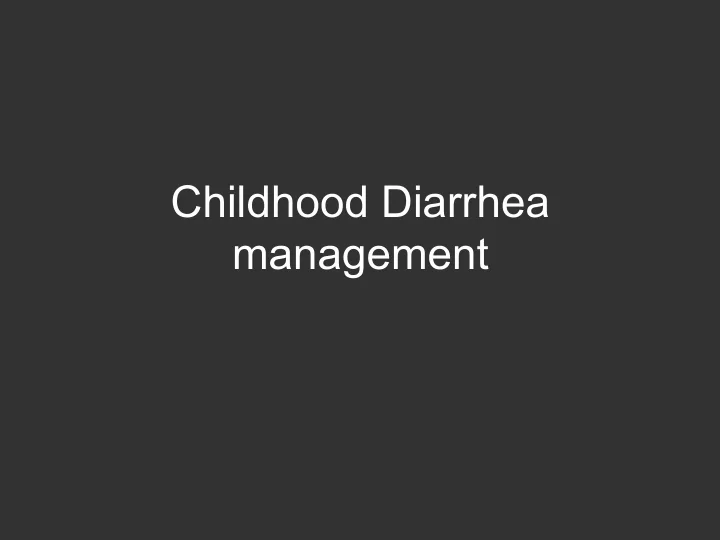

Childhood Diarrhea management
Diarrhea- 2-59 months Three or more loose stools in 24 hours
Diarrhea- 0-2 months Recent change in consistency or pattern of stool as noticed by mother or caretaker
Two or more signs SOME DEHYDRATION
Two or more signs SEVERE DEHYDRATION
Plan of Treatment � • No Dehydration: � � PLAN-A � � • Some Dehydration: � PLAN-B � � • Severe Dehydration: � PLAN-C �
PLAN – A � Treat Diarrhea at Home. � 4 Rules of Home Treatment: � GIVE EXTRA FLUID � CONTINUE FEEDING � WHEN TO RETURN � [ADVICE TO MOTHER] � GIVE ORAL ZINC FOR 14 DAYS �
PLAN – A � Recommended drinks for a child with diarrhoea include: • breastmilk (mothers should breastfeed more often than usual) • ORS • soups • rice water • fresh fruit juices • coconut water • clean water from a safe source.
PLAN – A � • for a child under the age of 2 years: between 1/4 and 1/2 of a large (250-millilitre) cup • for a child 2 years or older: between 1/2 and 1 whole large (250-millilitre) cup
PLAN – A � • Drinks should be given from a clean cup. • A feeding bottle should not be used. • If the child vomits, the caregiver should wait 10 minutes and then begin again to give the drink to the child slowly, small sips at a time. • The child should be given extra liquids in addition to regular foods and drinks until the diarrhea has stopped.
PLAN – A � Continue usual feeding, which the child was taking before becoming sick 3-4 times � � (6 times) � � Up to 6 months of age: �� � Exclusive Breast feeding � � 6 months to 12 months of age: � � add Complementary Feeding � � 12 months and above: � � Family Food �
PLAN – A � � Advise mother to return immediately if the child has any of these signs: � � passes several watery stools in an hour passes blood in the stool vomits frequently has a fever is extremely thirsty does not want to drink refuses to eat has sunken eyes looks weak or is lethargic has had diarrhoea for several days � �
PLAN – B � Plan-B is carried out at ORT Corner in OPD/ clinic/ PHC � Treat ‘some’ dehydration with ORS (50-100 ml/ kg � Give 75 ml/kg of ORS in first 4 hours � If the child wants more, give more � After 4 hours: � � Re-assess and classify degree of dehydration. �
PLAN – C � • Give 100 ml/kg Ringers lactate solution or Normal saline as follows Age ¡ First give 30 ml/kg in ¡ Then give 70 ml/kg in ¡ Infants ¡ 1 hour ¡ 5 hours ¡ 1-5 years ¡ 30 minutes ¡ 2 ½ hours ¡
PLAN – C � • Reassess child every 1-2 hours. If hydration status is not improving, give the IV fluid more rapidly. • Also give ORS (about 5 ml/kg/hour) as soon as the child can drink, usually after 3-4 hours (infants) or 1-2 hours (children) • Reassess an infant after 6 hours and a child after 3 hours. Classify dehydration. Then choose the appropriate plan (A, B, or C) to continue • If IV treatment is not available immediately start rehydration by tube (or mouth) with ORS solution: 20 ml/kg/hour for 6 hours (total of 120 ml/kg)
ORS Sodium chloride ¡ 2.6 gm ¡ Trisodium citrate dehydrate ¡ 2.9 gm ¡ Potassium chloride ¡ 1.5 gm ¡ Glucose ¡ 13.5 gm ¡ ! Total ¡ 20.5 gm ¡
ORS Sodium ¡ 75 mmol ¡ Citrate ¡ 10 mmol ¡ Potassium ¡ 20 mmol ¡ Glucose ¡ 75 mmol ¡ Chloride ¡ 65 mmol ¡ Total ¡ 245 mmol ¡
Dose of Zinc • 6 mo-5 yrs 20 mg for 14 days • 2- 6 months 10 mg for 14 days
DYSENTERY Dysentery ¡ Blood in the • Treat with oral Cotrimoxazole for 5 stool but no days. dehydration ¡ Blood in the Severe • Give first dose of intramuscular Dysentery ¡ stool in a young ampicillin and gentamicin if the young infant (0-2 infant has low weight, dehydration or months) ¡ another severe classification • Refer the infant urgently to hospital. • The mother should give frequent sips of ORS on the way and continue breastfeeding.
PERSISTENT DIARRHEA Dehydration present ¡ • SEVERE Treat dehydration before PERSISTENT referral unless the child has DIARRHOEA ¡ another severe classification. Refer to hospital ¡ • • No Dehydration PERSISTENT Advise the mother on feeding DIARRHOEA ¡ a child who has PERSISTENT DIARRHOEA • Give single dose of vitamin A • Give zinc sulphate 20 mg daily for 14 days Follow-up in 5 days. ¡ •
• Exclusive Breastfeeding • Improved dietary Habits • Safe and clean water PREVENTION OF DIARRHEA
Recommend
More recommend